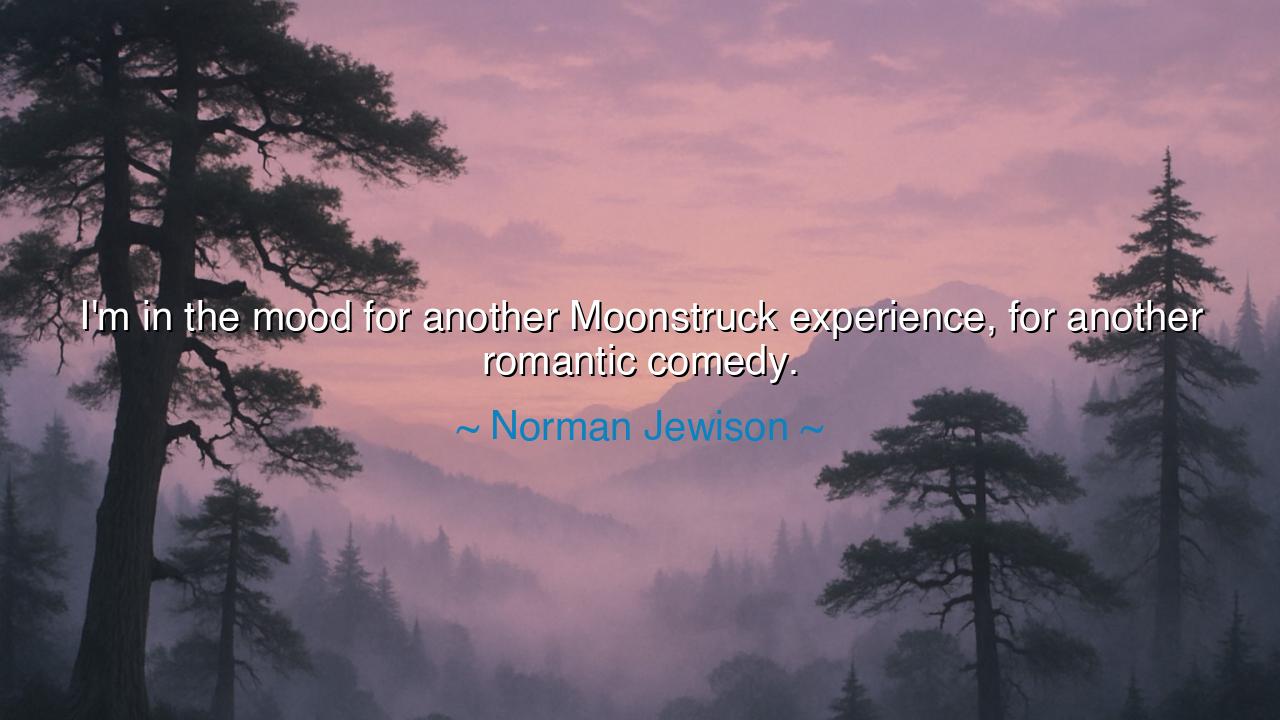
I'm in the mood for another Moonstruck experience, for another






"I'm in the mood for another Moonstruck experience, for another romantic comedy." – Norman Jewison. In these words, Jewison yearns for the magic and delight that comes with the timeless charm of a romantic comedy, specifically referencing his own iconic film, Moonstruck. This film, with its quirky characters, touching emotions, and blend of humor and love, speaks to a universal longing: the desire for connection, the joy of love, and the transformation that love often brings to our lives. Jewison’s desire for another such experience is not just a wish for more entertainment, but a longing to capture again the elusive beauty of love's ability to surprise, uplift, and heal—even in the most unlikely of circumstances.
In the ancient world, love was often portrayed as a divine force—one that could cause even the gods to act in unexpected ways. The Greek myths are filled with stories of gods and mortals alike experiencing the whims of Eros, the god of love, who would make lovers out of enemies, bring enemies together, and turn the course of fate. One of the most famous stories is that of Orpheus and Eurydice, where the power of love itself almost defied death. Love, in these stories, is not just an emotion—it is a force of nature, capable of transforming and healing, much like the romantic comedies that Jewison so fondly wishes to replicate.
Similarly, Plato believed that love was the highest form of connection between human beings and the divine. In his Symposium, he wrote about Eros as a force that transcends physical desire and leads to a more profound understanding of beauty and truth. The romantic comedy genre often reflects this idea, albeit in a more accessible and humorous way. These films, at their core, are about the transformative journey love offers—moving from misunderstanding to understanding, from isolation to connection, and from conflict to reconciliation. Just as in Moonstruck, the characters find their most authentic selves through their romantic entanglements, so too does love in the ancient world serve as a means of personal revelation.
Consider the journey of Jane Austen's Elizabeth Bennet in Pride and Prejudice. Her initially judgmental nature and misconceptions about love are shattered as she falls for the seemingly proud Mr. Darcy. Through her romantic journey, Elizabeth evolves from a woman bound by prejudice and pride into someone who embraces love with humility and openness. Much like the characters in romantic comedies, she must navigate the misunderstandings and awkwardness that come with falling in love, only to discover that love is more complicated, and yet more rewarding, than she could have imagined. The romantic comedy, like Austen’s work, brings the audience along on a journey of transformation—a theme that has made such stories resonate across generations.
The lesson in Jewison's longing for another “Moonstruck experience” is that the beauty of romantic comedies lies not just in their humor or escapism, but in the hope they offer. They speak to the possibility of finding love in unexpected places, of opening our hearts despite our fears or reservations, and of transformation through connection. These stories remind us that, even in the face of difficulty or miscommunication, love has the power to redeem, to heal, and to transform our lives. They are a celebration of the possibility of joy—a joy that is born when we allow ourselves to be vulnerable and open to the unexpected.
In our own lives, we too should seek to embody this spirit of love and transformation. Whether in romantic relationships, friendships, or even in our professional lives, we are all on some form of journey to connect with others and to open ourselves up to the possibilities of love, understanding, and compassion. Take chances, just as the characters in romantic comedies do. Allow yourself to be vulnerable, to be imperfect, and to accept the joys and sorrows that come with being open to the world and the people around you. Embrace the unexpected—whether in love or life—because it is often through these surprises that we find our greatest transformations.
Thus, let us follow Jewison's nostalgic wish not just as a call for more light-hearted entertainment but as a reminder that, in our own lives, love is the transformative force that can heal, shape, and redeem. Let us seek to create stories, whether in our relationships or within ourselves, that embrace the unexpected beauty of love. By doing so, we can experience our own romantic comedies—where, despite the chaos, the misunderstandings, and the trials, we emerge more whole, more connected, and more authentic in the end.






AAdministratorAdministrator
Welcome, honored guests. Please leave a comment, we will respond soon